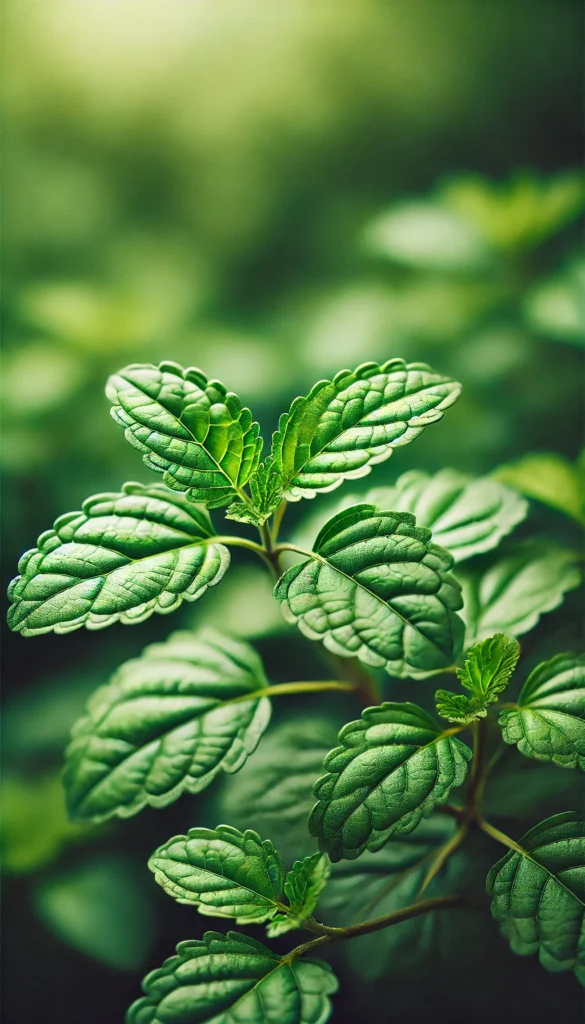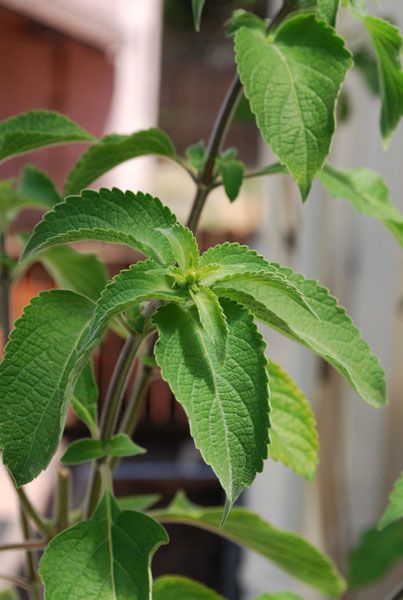Tulsi, also known as Holy Basil, is more than just a plant; it is a revered herb in Indian culture, often referred to as the “Queen of Herbs.” For centuries, Tulsi has held a special place in Indian households, not only for its medicinal properties but also for its spiritual significance. In Ayurveda, Tulsi is considered a powerful adaptogen, capable of enhancing the body’s natural defense mechanisms and promoting overall well-being.
Growing up in a traditional Indian family, Tulsi was an integral part of our daily lives. I remember my grandmother starting her day with a cup of freshly brewed Tulsi tea, which she believed kept her immune system strong and her mind calm. Our home always had a Tulsi plant in the courtyard, symbolizing purity and wellness. As a child, whenever I had a cold or a cough, my mother would prepare a concoction of Tulsi leaves, ginger, and honey, which worked wonders in providing relief.
Over the years, I have continued this tradition, incorporating Tulsi into my own family’s routine. Its myriad health benefits and cultural significance make it a timeless herb that connects generations and keeps us grounded in nature’s wisdom.
Key Takeaways
- Boosts Immunity: Tulsi enhances the immune system with its rich antioxidant content and essential oils, protecting against infections.
- Reduces Stress and Anxiety: As an adaptogen, Tulsi lowers cortisol levels, promoting mental balance and reducing stress.
- Supports Respiratory Health: Tulsi’s anti-inflammatory and antimicrobial properties help manage conditions like asthma, bronchitis, and colds.
- Promotes Heart Health: Tulsi helps regulate cholesterol and blood pressure, contributing to cardiovascular health.
- Enhances Digestive Health: Tulsi aids digestion by stimulating digestive enzymes and soothing the gastrointestinal tract.
- Anti-inflammatory and Anti-bacterial: Tulsi’s properties help reduce inflammation and fight bacterial infections, supporting overall health.
- Easy to Incorporate: Tulsi can be used in fresh leaves, tea, or supplement form, making it versatile and easy to add to your daily routine.
- Simple to Grow at Home: Tulsi can be grown in gardens or pots, providing fresh leaves for daily use and enhancing your living environment.
What is Tulsi?

Tulsi, botanically known as Ocimum sanctum or Ocimum tenuiflorum, is a sacred herb in India with three main varieties: Rama, Krishna, and Vana. Rama Tulsi has green leaves, Krishna Tulsi is known for its purple leaves, and Vana Tulsi, also called wild Tulsi, has light green leaves.
The Tulsi plant is a perennial shrub that grows about 30 to 60 cm tall, with aromatic leaves and small purplish or white flowers. Commonly found in Indian households and temples, Tulsi is used in various forms such as fresh leaves, dried powder, and essential oil. It is widely used for making herbal teas, medicinal concoctions, and as a seasoning in cooking. Its leaves are known for their strong aroma and slightly peppery flavor, making it a versatile herb for both culinary and therapeutic purposes.
Health Benefits of Amla (Indian Gooseberry)
Nutritional Profile of Tulsi

Tulsi, or Holy Basil, is a nutritional powerhouse packed with essential vitamins and minerals. It is rich in vitamins A, C, and K, which are crucial for maintaining healthy vision, immune function, and blood clotting, respectively. Additionally, Tulsi provides a good amount of calcium, iron, magnesium, and potassium. Calcium and magnesium are vital for bone health, while iron is essential for red blood cell production. Potassium, on the other hand, helps regulate fluid balance and supports proper muscle function.
Beyond its vitamin and mineral content, Tulsi is renowned for its potent antioxidant properties. It contains a variety of phytonutrients, including flavonoids and phenolic compounds, which help neutralize harmful free radicals in the body. These antioxidants protect cells from oxidative stress, reducing the risk of chronic diseases such as heart disease, diabetes, and cancer. Moreover, Tulsi’s anti-inflammatory and anti-microbial properties further enhance its role in promoting overall health and well-being. Regular consumption of Tulsi can thus contribute to a stronger immune system and better protection against infections and diseases.
Health Benefits of Tulsi

1. Boosts Immunity
Tulsi is renowned for its ability to enhance the immune system. It is rich in antioxidants and phytonutrients, which help the body combat free radicals and prevent oxidative stress. These compounds also stimulate the production of immune cells, thereby bolstering the body’s defense mechanisms against infections and diseases. Tulsi leaves are packed with essential oils like eugenol, citronellol, and linalool, which have potent anti-microbial properties. These oils help protect the body against a wide range of pathogens, including bacteria, viruses, and fungi.
In my own experience, incorporating Tulsi into my daily routine has significantly reduced the frequency of common colds and other minor infections. I often make a simple Tulsi tea by boiling a few fresh leaves in water and drinking it first thing in the morning. My family has also adopted this habit, and we have noticed a marked improvement in our overall health and resistance to seasonal illnesses.
2. Reduces Stress and Anxiety
Tulsi is classified as an adaptogen, a natural substance that helps the body adapt to stress and promotes mental balance. One of the ways Tulsi accomplishes this is by reducing cortisol levels, the hormone associated with stress. Regular consumption of Tulsi can help mitigate the physiological effects of stress and anxiety, leading to a calmer and more balanced state of mind.
Incorporating Tulsi into my stress-relief routine has been a game-changer. I often prepare a soothing Tulsi tea in the evenings, combining it with a few other calming herbs like chamomile and lavender. This not only helps me unwind after a long day but also improves my sleep quality. For those with busy, stressful lives, adding Tulsi to your daily regimen—whether as a tea, supplement, or simply chewing fresh leaves—can make a noticeable difference in managing stress levels.
3. Supports Respiratory Health
Tulsi is a traditional remedy for respiratory conditions like asthma, bronchitis, and the common cold. Its anti-inflammatory properties help to soothe inflamed airways, while its antimicrobial effects help to clear respiratory infections. Tulsi also acts as a natural expectorant, making it easier to expel mucus and clear the respiratory tract.
Whenever someone in my family comes down with a cough or cold, I prepare a Tulsi decoction by boiling fresh Tulsi leaves with ginger and a bit of honey. This home remedy not only alleviates symptoms but also speeds up recovery. For those with chronic respiratory issues, regular consumption of Tulsi in various forms—be it tea, fresh leaves, or essential oils—can provide significant relief and improve overall lung health.
4. Promotes Heart Health
Tulsi has a positive impact on cardiovascular health by helping to manage cholesterol levels and blood pressure. The antioxidants in Tulsi reduce oxidative stress, which is a significant contributor to heart disease. Additionally, Tulsi helps in lowering LDL (bad) cholesterol and increasing HDL (good) cholesterol, thus maintaining a healthy lipid profile.
There are several scientific studies that support these claims. For instance, research has shown that regular consumption of Tulsi can lower blood pressure and reduce the risk of developing hypertension. In my own life, I’ve seen how incorporating Tulsi tea into my daily routine has helped manage my husband’s cholesterol levels, as confirmed by his periodic health check-ups. By making Tulsi a part of your diet, you can take a natural step towards maintaining a healthy heart.
5. Enhances Digestive Health
Tulsi is also beneficial for the digestive system. It helps stimulate the production of digestive enzymes, which aids in the efficient breakdown and absorption of food. Additionally, Tulsi’s anti-inflammatory properties help soothe the gastrointestinal tract, reducing symptoms of indigestion, bloating, and acid reflux.
Whenever I experience digestive discomfort, I turn to Tulsi for relief. A simple concoction of Tulsi leaves boiled in water, sometimes with a bit of fennel or mint, works wonders for soothing my stomach. I’ve also found that drinking Tulsi tea regularly helps maintain a healthy digestive system and prevents common issues like constipation and irritable bowel syndrome. For those struggling with digestive problems, incorporating Tulsi into your daily routine can provide natural and effective relief.
6. Anti-inflammatory and Anti-bacterial Properties
Tulsi’s anti-inflammatory and anti-bacterial properties make it a powerful ally in maintaining overall health. The eugenol and other essential oils in Tulsi help reduce inflammation and fight bacterial infections. This makes Tulsi effective in treating various inflammatory conditions and preventing infections.
In my personal experience, applying a paste of fresh Tulsi leaves to minor cuts and wounds has helped in quicker healing and prevented infections. I also use Tulsi-infused oil for massages, which helps in relieving joint and muscle pain. By integrating Tulsi into your health regimen, whether through topical applications or internal consumption, you can leverage its potent anti-inflammatory and anti-bacterial benefits to enhance your overall well-being.
In conclusion, Tulsi is a versatile and powerful herb with a wide range of health benefits. From boosting immunity and reducing stress to promoting heart and digestive health, Tulsi proves to be a valuable addition to any natural health regimen. By incorporating Tulsi into your daily routine, you can enjoy its numerous therapeutic benefits and support your journey towards better health.
Refined Oils Vs Cold Pressed Oils
How to Incorporate Tulsi into Your Daily Routine
Fresh Leaves
Using fresh Tulsi leaves in your daily diet is a simple and effective way to reap its health benefits. You can chew 2-3 fresh leaves every morning on an empty stomach to boost your immunity and improve digestion. Another way to incorporate fresh Tulsi is by adding it to your salads, smoothies, or even as a garnish for soups and stews. For a refreshing drink, blend a handful of fresh Tulsi leaves with water, lemon juice, and honey to create a delicious and healthy Tulsi lemonade.
Tulsi Tea
Tulsi tea is a wonderful way to enjoy the health benefits of this powerful herb. Drinking Tulsi tea regularly can help reduce stress, improve digestion, and boost your immune system. To prepare Tulsi tea at home, simply boil a cup of water and add 5-7 fresh Tulsi leaves (or a teaspoon of dried Tulsi). Let it simmer for 5-10 minutes, then strain and enjoy. You can enhance the flavor by adding a slice of ginger, a dash of cinnamon, or a bit of honey.
Tulsi Supplements
Tulsi supplements are a convenient option for those who may not have access to fresh leaves or prefer a more concentrated form. These supplements come in various forms, including capsules, tablets, and tinctures. When choosing Tulsi supplements, it’s important to look for high-quality, organic products to ensure you’re getting the purest form of the herb. Check the labels for certifications like USDA Organic or Non-GMO Project Verified. Additionally, consult with a healthcare provider to determine the appropriate dosage for your specific needs.
Incorporating Tulsi into your daily routine can be easy and versatile. Whether you prefer fresh leaves, tea, or supplements, making Tulsi a regular part of your diet can significantly enhance your overall health and well-being.
Health Benefits of Turmeric (Haldi)
Growing Tulsi at Home
Growing Tulsi at home is a rewarding and straightforward process that can provide you with a constant supply of fresh leaves. Whether you have a garden or just a few pots, Tulsi thrives well in both environments. Here are some tips to help you get started:
- Location and Soil: Tulsi prefers a sunny spot with at least 4-6 hours of direct sunlight each day. Plant it in well-draining soil enriched with organic compost.
- Planting: You can start Tulsi from seeds or cuttings. If using seeds, plant them about 1/4 inch deep in the soil. Keep the soil moist but not waterlogged. If you’re using cuttings, place them in water until roots develop, then transfer them to soil.
- Watering: Water the plant regularly but avoid overwatering. The soil should be kept slightly moist. During hot weather, you may need to water the plant more frequently.
- Pruning: Regularly pinch off the top leaves to encourage bushier growth and prevent the plant from becoming too leggy. Pruning also helps promote more leaf production.
Having fresh Tulsi readily available at home has been a blessing for my family. Whenever we need fresh leaves for tea or remedies, we simply pluck them from our garden. The aroma of Tulsi adds a serene ambiance to our home, and its presence reminds us of the health benefits it provides. Cultivating Tulsi also connects us to nature, fostering a sense of tranquility and well-being.
Benefits of Organic Castor Oil
Conclusion
Tulsi, or Holy Basil, offers a multitude of health benefits, from boosting immunity and reducing stress to promoting heart and digestive health. Its anti-inflammatory and anti-bacterial properties make it a versatile herb for overall wellness. By incorporating Tulsi into your daily routine through fresh leaves, tea, or supplements, you can harness its therapeutic properties to enhance your health.
I encourage you to bring Tulsi into your life and experience its benefits firsthand. If you already use Tulsi, I would love to hear about your experiences. Feel free to share your stories or ask any questions in the comments section below. Let’s embrace the natural goodness of Tulsi for a healthier, happier life.
FAQ: Health Benefits of Tulsi (Holy Basil)
1. What are the primary health benefits of Tulsi?
Tulsi, or Holy Basil, is known for its numerous health benefits, including:
- Boosting immunity: Tulsi is rich in antioxidants and essential oils that enhance the immune system.
- Reducing stress and anxiety: As an adaptogen, Tulsi helps lower cortisol levels, promoting mental balance.
- Supporting respiratory health: Tulsi’s anti-inflammatory and antimicrobial properties make it effective against respiratory issues like asthma, bronchitis, and colds.
- Promoting heart health: Tulsi helps manage cholesterol and blood pressure levels, reducing the risk of heart disease.
- Enhancing digestive health: Tulsi stimulates digestive enzymes and soothes the gastrointestinal tract.
2. How can I incorporate Tulsi into my daily routine?
There are several ways to incorporate Tulsi into your daily routine:
- Fresh Leaves: Chew 2-3 fresh leaves on an empty stomach, add them to salads, smoothies, or use as a garnish.
- Tulsi Tea: Boil 5-7 fresh or 1 teaspoon of dried leaves in water for 5-10 minutes. Strain and enjoy, possibly with ginger, cinnamon, or honey for added flavor.
- Supplements: Choose high-quality, organic Tulsi supplements in the form of capsules, tablets, or tinctures.
3. Can Tulsi help with respiratory issues?
Yes, Tulsi is highly beneficial for respiratory health. Its anti-inflammatory properties help soothe inflamed airways, while its antimicrobial effects clear respiratory infections. Tulsi acts as a natural expectorant, aiding in the expulsion of mucus. It is effective for conditions like asthma, bronchitis, and the common cold. A common home remedy is a Tulsi decoction made by boiling leaves with ginger and honey.
4. What types of Tulsi are there, and how do they differ?
There are three main types of Tulsi:
- Rama Tulsi: Known for its green leaves and subtle aroma, commonly used in teas and culinary applications.
- Krishna Tulsi: Recognized by its purple leaves, it has a stronger taste and is often used in Ayurvedic medicine.
- Vana Tulsi: Also known as wild Tulsi, it has light green leaves and grows in the wild. It is less common but equally beneficial.
Each type has similar health benefits but may vary slightly in taste and potency.
5. How can I grow Tulsi at home?
Growing Tulsi at home is easy and rewarding:
- Location: Choose a sunny spot with 4-6 hours of direct sunlight.
- Soil: Use well-draining soil enriched with organic compost.
- Planting: Start with seeds or cuttings. Plant seeds 1/4 inch deep in moist soil. For cuttings, place them in water until roots develop, then transfer to soil.
- Watering: Keep the soil slightly moist but avoid overwatering.
- Pruning: Regularly pinch off top leaves to encourage bushier growth and more leaf production.
Having fresh Tulsi at home provides easy access to its numerous health benefits and enhances the ambiance of your living space.
